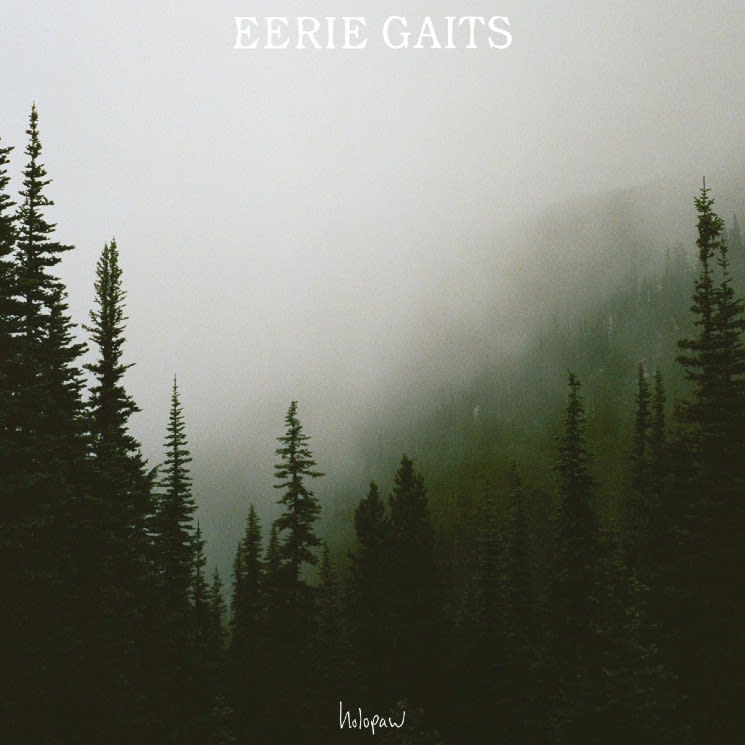Wild Pink's Yolk in the Fur was one of the more underappreciated gems of 2018, with a luscious, highly textural sound at the nexus of shoegaze, emo and heartland rock. The band's songwriter John Ross has meanwhile helmed his own solo instrumental project called Eerie Gaits. With it, he's basically been taking country and western music, stuffing it into a capsule, and sending it out into the ether to watch it explode, an approach similar to William Tyler's modern Americana.
Since this project's exceedingly charming debut Bridge Music, Eerie Gaits has gone in several different directions in pursuit of exploration. Holopaw has no obligation to format or genre, with an enterprising choice of instruments and sounds that run the gamut of post-rock, folk, ambient and cinematic music, with even some reggae and synth-pop thrown in there.
The opening track "What's Eating You" is built on crisp, reverbed electric guitar, a groovy rhythm and tons of atmosphere; you can almost picture Sigur Rós reinterpreting a song by the Police. It's one of a few tracks on the album that make it easy to imagine Ross's gentle voice singing along, which incidentally makes it a bit curious why they're not Wild Pink songs. The beautiful "Out in the Tall Grass" and "The Lure Follows the Line" channel the Brian Eno-esque styles of artists like Hammock and Eluvium. "The Rainbow Trout and the Wicker Creel" is an oddball that's only a hair removed from a karaoke version of the cheesiest of Glee songs.
At the end of an album that's so lively, "99, 100" closes things out with an almost cruel twist; it's dark and foreboding (and, you could say, eerie), like something out of Arrival or a particularly ominous episode of Black Mirror. To this point, Holopaw will have had you thinking of serene lakesides, snow-capped mountains, vast fields of sunflowers and deeply hued sunsets — and then suddenly the ground vanishes beneath your feet and you find yourself hopelessly lost in the unending, labyrinthine blackness of The Navidson Record. How did that happen?
It's an artistic experiment, and as with many experiments, the results are fascinating, rewarding and imperfect. Ross's ideas are interesting, adventurous and often gorgeous, but some are too divergent to form a unified whole. Give those ideas more opportunity to unfold, cut out the ones that stray too far from the tone of the larger work, and Eerie Gaits could be something that's not only unique, but also resolute and even transcendent.
(Sound as Language)Since this project's exceedingly charming debut Bridge Music, Eerie Gaits has gone in several different directions in pursuit of exploration. Holopaw has no obligation to format or genre, with an enterprising choice of instruments and sounds that run the gamut of post-rock, folk, ambient and cinematic music, with even some reggae and synth-pop thrown in there.
The opening track "What's Eating You" is built on crisp, reverbed electric guitar, a groovy rhythm and tons of atmosphere; you can almost picture Sigur Rós reinterpreting a song by the Police. It's one of a few tracks on the album that make it easy to imagine Ross's gentle voice singing along, which incidentally makes it a bit curious why they're not Wild Pink songs. The beautiful "Out in the Tall Grass" and "The Lure Follows the Line" channel the Brian Eno-esque styles of artists like Hammock and Eluvium. "The Rainbow Trout and the Wicker Creel" is an oddball that's only a hair removed from a karaoke version of the cheesiest of Glee songs.
At the end of an album that's so lively, "99, 100" closes things out with an almost cruel twist; it's dark and foreboding (and, you could say, eerie), like something out of Arrival or a particularly ominous episode of Black Mirror. To this point, Holopaw will have had you thinking of serene lakesides, snow-capped mountains, vast fields of sunflowers and deeply hued sunsets — and then suddenly the ground vanishes beneath your feet and you find yourself hopelessly lost in the unending, labyrinthine blackness of The Navidson Record. How did that happen?
It's an artistic experiment, and as with many experiments, the results are fascinating, rewarding and imperfect. Ross's ideas are interesting, adventurous and often gorgeous, but some are too divergent to form a unified whole. Give those ideas more opportunity to unfold, cut out the ones that stray too far from the tone of the larger work, and Eerie Gaits could be something that's not only unique, but also resolute and even transcendent.
